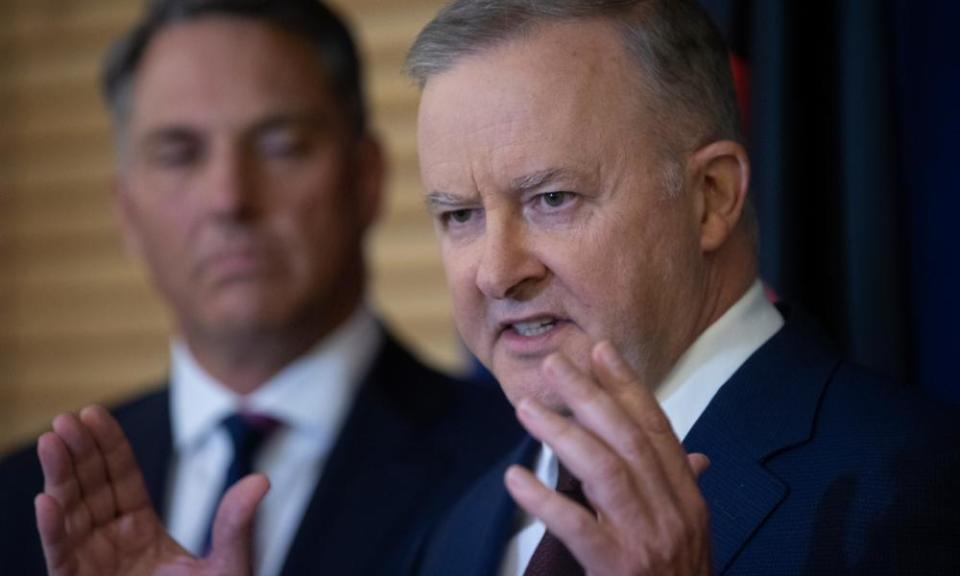Labor reshuffle: Anthony Albanese elevates Richard Marles to new super portfolio

Anthony Albanese has elevated his deputy, Richard Marles, to a super portfolio while clipping the wings of Jim Chalmers, Tanya Plibersek and Clare O’Neil in a frontbench reshuffle intended to shore up his leadership and sharpen Labor’s messaging ahead of a possible election later this year.
Marles, the Victorian rightwinger and previous shadow defence minister, has been handed a new portfolio of national reconstruction post Covid-19 – which encompasses employment, skills and small business – and Albanese has elevated Brendan O’Connor, the Victorian leftwinger who backed Bill Shorten to become Labor leader over Albanese in the 2013 leadership contest, to defence.
Thursday’s announcement was brought forward after news broke late on Wednesday that a key Albanese ally, Mark Butler, was to be moved from the climate change portfolio to health and ageing.
Chalmers, the shadow treasurer, continues in his central economic portfolio, but loses primary responsibility for superannuation – a major political issue this year – to Stephen Jones, a longtime backer of Albanese.
Related: Joel Fitzgibbon calls for changes to Labor's leader selection rules as Albanese finalises reshuffle
Plibersek keeps her shadow education portfolio but loses primary responsibility for skills to Marles, while the New South Wales rightwinger Ed Husic takes innovation from the Victorian rightwinger O’Neil, who has been outspoken about Labor’s policy direction after the 2019 election defeat.
Butler’s replacement in the critical climate and energy portfolio will be the rightwinger Chris Bowen, who has previously advocated that Labor explore a policy framework like the Green New Deal.
Butler signalled to Albanese over the summer that he was prepared to exit the role to stop the internal bloodletting about whether or not Labor’s climate change policy at the last federal election was too ambitious, and Bowen will seek to frame climate change as an issue of economic reform.
The shifting of key personnel comes within days of federal parliament resuming for the new year, and amid rolling speculation about whether Albanese maintains a firm grip on the party leadership.
With morale low in the caucus, there has been persistent speculation about whether Albanese has the capacity to beat Scott Morrison at the next federal election given the pandemic has benefited incumbents in Australian electoral contests.
Plibersek, Chalmers, Bowen and Marles have been floated as alternatives to the incumbent. Labor MPs believe Plibersek is now openly positioning for the top job in the event there is a serious move against Albanese once the parliamentary year resumes.
The veteran rightwinger Joel Fitzgibbon, who has been leading the internal offensive against Butler and the climate policy, on Thursday added further fuel to the fire by saying Labor should consider changing the Rudd-era rules governing the selection of federal party leaders because the current system was “very untidy”.
The Rudd rules, which allow grassroots party members a say in the selection of the federal leader, have imposed a period of leadership stability on the Labor caucus over the past two parliamentary terms. But party insiders insist it is within the power of the caucus to change the current system.
Albanese declared on Thursday he would lead Labor to the next federal election and compared his career trajectory to Joe Biden, the incoming president of the United States.
The Labor leader said Biden had been “underestimated by some” despite being an experienced politician and a former vice-president, with the conventional wisdom being he couldn’t defeat Donald Trump. “He is now president of the United States, and I will be the leader of this country after the next election,” Albanese said.
He also slapped down Fitzgibbon’s intervention. He said the Rudd rule had been imposed to end civil wars about the party leadership, “the sort of nonsense that frankly didn’t serve Labor well, either in opposition or when we were in government”.
Related: Labor set to support media code but says PM faces serious questions after Google threat
Despite removing Butler, Labor’s most consistent advocate for climate action, from the key portfolio, the Labor leader said the opposition would stay the course on emissions reduction despite the internal ruckus.
But Albanese continued to duck questions from reporters about whether he would set a medium-term emissions reduction target before the next federal election.
Butler had previously given a firm commitment that Labor would adopt a medium-term target consistent with the science before the next federal election. But Albanese has always been more Delphic about his plans.
The reshuffle preserves the positions of key Albanese backers. Penny Wong remains in foreign affairs, Kristina Keneally in home affairs, Tony Burke in industrial relations, Katy Gallagher in finance and Linda Burney in families and social services.
Julie Collins, who had been the shadow minister for aged care, moves to agriculture, and West Australian Madeleine King adds resources to her shadow trade portfolio.

 Yahoo Finance
Yahoo Finance 